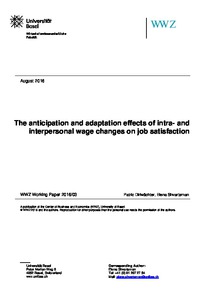The anticipation and adaptation effects of intra- and interpersonal wage changes on job satisfaction
"This paper analyses how individual job satisfaction is affected by wage changes. In order to account for potential dynamic effects of wage changes on job satisfaction, we include lead and lag effects of income changes in our analysis. Furthermore, we examine the role of social comparisons, i.e...
| Main Authors: | , |
|---|---|
| Institution: | ETUI-European Trade Union Institute |
| Format: | TEXT |
| Language: | English |
| Published: |
Basel
2016
WWZ |
| Subjects: | |
| Online Access: | https://www.labourline.org/KENTIKA-19101164124919293469-The-anticipation-and-adaptatio.htm |
| Summary: | "This paper analyses how individual job satisfaction is affected by wage changes. In order to account for potential dynamic effects of wage changes on job satisfaction, we include lead and lag effects of income changes in our analysis. Furthermore, we examine the role of social comparisons, i.e. how an individual’s job satisfaction is driven not only by changes in his wages, but also by the size of these changes relative to wage changes within his reference group. Results from an individual fixed effects regression indicate that wage increases have a statistically significant positive effect on job satisfaction. This effect exhibits a dynamic pattern. We observe an anticipation effect of a positive wage change, i.e. individuals are more satisfied with their job one year ahead of the wage increase. Also, we find statistically significant positive, but declining effects on job satisfaction four years after the wage increase, i.e. partial adaptation. We find that an additional increase in job satisfaction is obtained when the individual’s wage increase exceeds the average wage increase for his reference group. However, this effect does not appear to persist, as it is only statistically significant in the first period after the wage change." |
|---|---|
| Physical Description: | 31 p. Digital |

